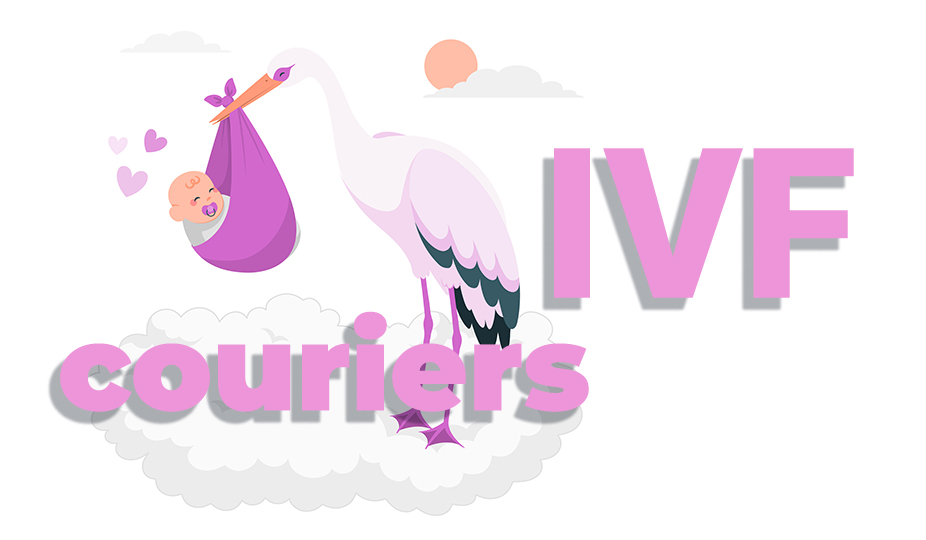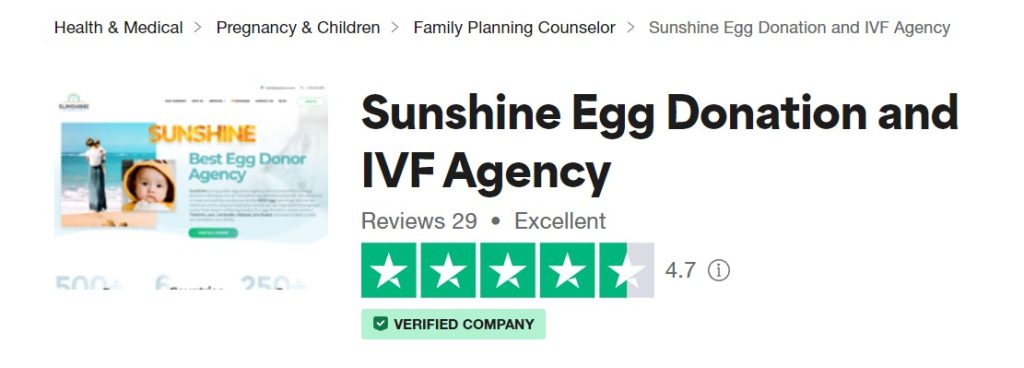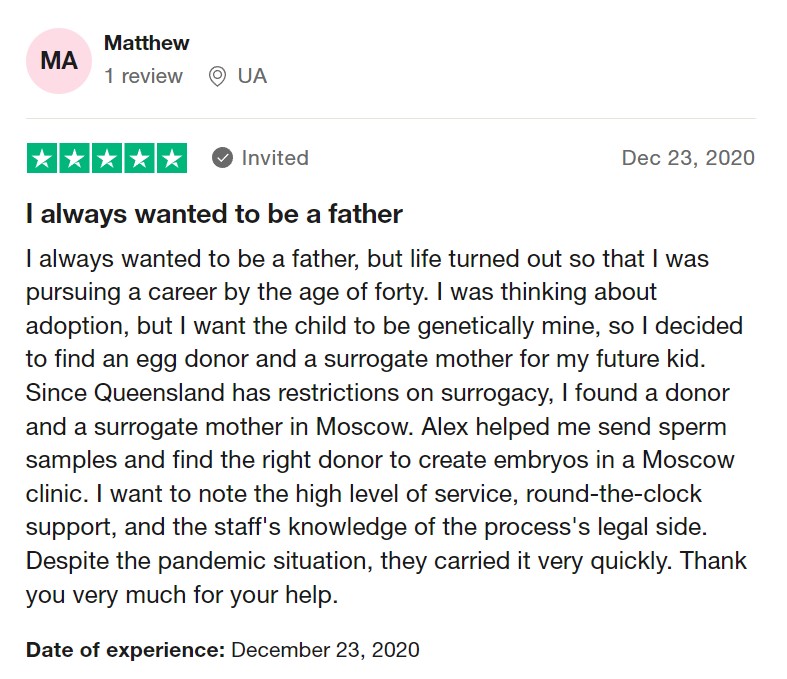IVF Couriers – How International Cryoshipping Works, Its Cost, and Reviews
IVF couriers are companies that provide safe transportation of frozen reproductive material such as embryos, sperm, and oocytes anywhere in the world. They use special medical containers, dewars, to keep the extremely low temperature of -196 °C.

Cryo shipping raises many questions for some people looking for donors abroad or preparing for the IVF program. Let’s understand how IVF courier works, the conditions for successful delivery, and how much the service costs.
Features of Freezing Sperm, Embryos, and Oocytes
Each biomaterial has unique characteristics. While sperm is an unpretentious tissue, eggs are more of a concern. Let’s overview different cases to choose the most relevant option for your situation.
How to Ship Sperm
Semen is the safest tissue for freezing and can be transferred over long distances. It is frozen by vitrification in liquid nitrogen vapor. Clinics store cryopreserved tissue in plastic, thin tubes – straws. One straw is usually enough for one IVF or ICSI program. For insemination, you may need 2-3 pieces.
The straws are stored in a container with liquid nitrogen to maintain a constant low temperature. If necessary, you may transfer them to any other clinic without harming the sperm. It is valid not only for local clinics: in the proper environment, cells travel anywhere in the world.
Sperm freezing is relevant in the following cases:
- When a biological father is far away, there is no need to travel to another country to start an IVF program. He can take sperm at the nearest clinic and send the preserved gametes by courier service.
- When you need sperm from a donor of a rare blood type and Rh factor, nationality, or with pronounced phenotypic characteristics, you might purchase a sample from another city or country. In addition, you may find a sperm donor in the database and organize retrieval and dispatching by IVF couriers.
How to Ship Oocytes
A similar process occurs with eggs. First, the specialist takes oocytes by puncture. Ovums are preserved by snap freezing within hours of collecting and maturation in an incubator. Like sperm, egg cells are in thin tubes of 3-4 pieces until a woman wants to thaw and use them to conceive a child.
Note that the eggs, your own or your donor’s, are yours alone. You are entitled to dispose of them. So, it is legal to send the straws to another city or country for further IVF.
Moreover, given that oocytes are delicate tissue, the donor can independently come to the desired clinic for egg retrieval instead of cryoshipping. We regularly organize trips to different countries and accompany donors throughout the program.
How to Ship Embryos
Like gametes, embryos can be preserved and transported by IVF couriers. Moreover, they are usually more viable than ovum: they are easier to tolerate transfer and thawing. Reproductive specialists successfully deal with this material in more than 90% of cases.
Freezing occurs as follows. Embryologists clean the cell and place it in a cryoprotectant – a chemical compounds – that prevent damage during freezing and thawing. They carry out cryopreservation at ultra-low temperatures to preserve the vital activity. You can see the process in the video below. The fertilized egg from the clip made a successful journey from Moscow to London!
Embyons are stored in straws of 2-4 units. It is possible to thaw only the whole stick, not in parts. Embryologists are responsible for preserving cells. They keep special accounting journals, copies of which they give to IVF couriers.
Regardless of the type, a journey is carried out with strict observance of all conditions to preserve reproductive tissues. The embryologist uses a pre-chilled dewar to place the frozen biomaterial. This container is filled with nitrogen (even a slight increase in temperature constitutes a danger to delicate tissue!) to keep the gametes from thawing.
The carrier receives a shipping kit and carefully monitors the dewar to save it from being turned over or damaged.
Let’s consider what transport is used for shipping.
Transport Types for Fast Biomaterial Delivery
Dispatching occurs in different ways. Check out the most popular and convenient ones.

Cryoshipping by Road
If the distance from the initial point to the destination does not exceed 1500 km, the gametes might be carried by car or train. This method has simplified logistics, so the courier brings the valuable cargo directly to the clinic without transfers.
Cryoshipping by Air
This option is suitable for international dispatching. However, there is a nuance here: x-ray irradiation. Cells do not tolerate radiation, as it leads to gamete degeneration, DNA changes, and mutations. To prevent any degree of damage, the best IVF couriers take the container as carry-on luggage and keep it under constant supervision.
| Criteria | By Road | By Air |
|---|---|---|
| Speed | Slower than air transport due to traffic, road conditions, and border crossings. | Faster compared to road transport. |
| Price | More cost-effective. | It is more expensive, especially for international delivery. |
| Compliance with conditions | It is easy to comply with the conditions since the material is in a container with nitrogen and travels without transfers. | Difficulties may arise due to the risk of X-ray exposure, so the cargo requires special monitoring. |
| Accessibility | Can reach more remote locations that may not be accessible by air. | Limited accessibility to remote areas. |
| Environmental Impact | Typically, it has a lower carbon footprint. | Generally, it has a higher carbon footprint due to fuel consumption. |
Shipping Frozen Embryos Stages
The delivery involves following specific safety protocols at all stages. Let’s look at each step the egg goes through before it reaches the right healthcare center.
- Quality control. Biomaterials undergo quality control assessments to ensure they are optimal for future use.
- Documentation. Specialists keep records with information about the date of preservation, the number of cells, and their quality.
- Packaging. The dewar is securely sealed to prevent the escape of gases and maintain a vacuum. Moreover, a secondary packaging system is in place to isolate it from the influence of external factors.
- Dispatching. It is where the direct work of IVF couriers begins. Carriers ensure compliance with the rules and monitor safety.
- Arrival. Upon arrival at the destination, the specialist checks the parcel for any signs of damage. If everything is okay, the embryologist thaws the tissues to begin the IVF program.

What is Better to Ship Embryos or Eggs?
Many women come to reproductive specialists with this question. However, there is no definite answer, as everything depends on individual factors, including age and planned time of conception. In this post, Sunshine specialists describe cases when it is better to freeze eggs and when you need embryos. You may also consult a doctor to decide your situation and choose the best way to prepare for your future IVF journey.
What Safety Measures Do IVF Couriers Follow?
It is necessary to keep the eggs safe to deliver them to a surrogate or patient in another country. IVF couriers international follow several mandatory measures to ensure smooth carriage.

- Stably low temperature. The sperm shipping kit has a temperature data logger that monitors the exact dewar temperature. The courier checks this critical parameter and submits a detailed report upon arrival at the clinic.
- X-ray protection. As a rule, the luggage is x-rayed at the airport. However, it carries a ruinous force to the cells and leads to destruction. Therefore, couriers, guided by special authorizations, ensure the container does not pass this control.
- Tipping protection. The dewar is in a shock-proof cover to protect the reproductive tissues from physical impact and prevent ruination.
IVF Couriers International Cost
The capabilities of international cryoshipping justify its price. The fact is that delivery is a chance to find donors in any part of the world. It allows patients to save money in the long run. For example, you may select a surrogate mother in Georgia or Ukraine, which will cost around $40,000. On the contrary, the price in the United States is $60,000 – $80,000. It is also relevant to biomaterial donation. Patients find it much more cost-effective to send donor eggs from Malaysia, Cambodia, etc.
Several details shape the price, including distance, urgency, and special requests. A determining factor is that reproductive tissues require special equipment, care, and protocols. In this process, the bio courier acts more than a carrier and monitors all indicators to ensure safety.
Check out the average service time and cost.
| Direction | Average Price (USD) | Delivery Time (Days) |
|---|---|---|
| Europe – Europe | *$1000 - $2,500 | 1-4 days |
| Europe – Asia | *$2,500 - $4,500 | 4-6 days |
| Europe - the USA | *$2000 - $5,000 | 4-6 days |
| Europe - Africa | *$3,500 - $5000 | 4-6 days |
| Europe – Australia | *$3,500 - $5,500 | 7-10 days |
| Europe – South America | *$3000 - $6,500 | 4-6 days |
Contact your IVF clinic to get an accurate price based on individual parameters.
* in case of sharing
IVF Couriers Reviews
Sunshine carriers deliver eggs worldwide and consistently receive positive reviews on Trustpilot, at the moment we are proud to hold first place in the family planning categories and are grateful to all our clients who are so brave to share their experiences. You can view the ratings or share your impressions if you have already used our services.

Read the testimonial of one of the satisfied clients of Sunshine Agency, who sent sperm samples from Queensland, Australia, to the clinic in Moscow to create an embryo and incubate a baby by a surrogate mother.
Matthew’s Review

IVF Couriers FAQ
Sperm remains viable as long as the environment remains consistently favorable. The cryo container maintains a low temperature for approximately 8 days. During this time, the carrier delivers the cargo to the desired destination without the risk of defrosting. It also applies to embryos and eggs.
Sure. You may transfer your reproductive cells to another clinic within the city or country. If you plan to travel with tissues abroad, you need the documents required by the country’s laws.
Some agencies offer an insurance package for frozen gametes. Thus, in case of cargo damage due to the courier fault, you will receive reimbursement.
Final Words about IVF Couriers
To sum up, IVF couriers solve the problem of biomaterial delivery and ensure smooth cooperation between reproductive medicine clinics worldwide. They dispatch eggs, sperm, and embryos to different countries and allow patients to choose donors in Asia, Africa, or Europe. Clients can rest assured that their cells are safe, as experts carefully protect them from thawing or physical damage.

If you have any questions about the delivery of reproductive cells or if you want to find a donor and start an IVF program, do not hesitate to contact Sunshine specialists for a detailed consultation. The experts will be happy to match you with a donor, assist you with transference, and ensure a smooth IVF program tailored to your needs.